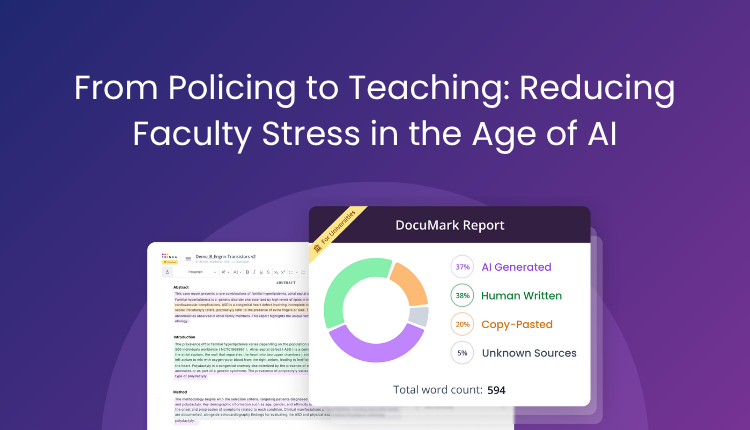From Policing to Teaching: Reducing Faculty Stress in the Age of AI

In recent years, the role of faculty has significantly evolved, driven largely by the rise of accessible AI tools. Instead of devoting their energy to teaching, mentoring, and inspiring students, educators increasingly find themselves acting as investigators—tasked with identifying and managing AI-generated content.
Since the advent of tools like ChatGPT, AI-written essays, responses, and even research papers have become more prevalent. Faculty are now expected to detect such content, justify their decisions, and manage these concerns—often with little institutional support. This shift calls for a deeper understanding of the underlying challenges and a long-term, promising solution.
The Rising Challenge of Maintaining Academic Integrity
Upholding academic honesty has never been more challenging. The influx of AI detection tools—both paid and free—offers inconsistent results, leaving faculty to rely on personal judgment. No tool offers perfect accuracy. False positives and unclear reports make already complex situations even more difficult, prompting many educators to cross-check with multiple tools, often creating more confusion than clarity.
Research confirms this growing frustration. Faculty are not only losing time but also facing rising levels of stress and burnout. The widespread use of AI by students has prompted educators to rethink assessment strategies, redesign their syllabi, and push for clearer institutional policies. Yet the emotional burden remains. Confronting students over potential misconduct can be distressing—what if it’s a misunderstanding or an honest mistake? The lack of clarity in current tools amplifies the discomfort, leading many to avoid these confrontations altogether.
What’s urgently needed is a shift in approach: from enforcing rules to encouraging ethical AI use. Rather than relying solely on reactive detection, institutions need tools that help students transparently demonstrate their writing process and learn responsible AI practices. That’s where Trinka’s DocuMark stands out.
Trinka DocuMark: Rethinking Authorship and Academic Integrity
Trinka DocuMark is designed to meet the real-world needs of educators. Instead of focusing only on final submissions, it tracks the writing journey—helping faculty and students navigate the research and writing process with full transparency.
Key Benefits for Faculty:
Automated Authorship Insights
DocuMark captures the evolution of a document—highlighting typed, pasted, or AI-generated content—providing a clear visual record from draft to submission. This means fewer assumptions and quicker, more confident evaluations.
Advanced Content Classification
It goes beyond AI detection by distinguishing student-written, edited, or pasted sections with precision. Faculty get clear indicators rather than vague percentages, enabling better feedback and more ethical student guidance. This clarity also helps identify students who may be struggling and misusing tools unintentionally.
Effort & Engagement Metrics
DocuMark shows how much time students spent on drafting, revising, and editing. Faculty can spot early signs of disengagement, offer timely support, and reward genuine effort—even when the final submission isn’t flawless.
Transparent, Shareable Reports
With timestamped versions and a replay-like timeline, reports are shareable and easy to understand. These can be used for evidence-based discussions, appeals, or documentation—cutting down on disputes and administrative hassles.
Smooth LMS Integration & Full Support
DocuMark integrates directly with platforms like Canvas, Blackboard, Moodle, and even Word and Google Docs—letting students work in familiar tools without extra steps. Plus, comprehensive onboarding, training, and support ensure faculty feel confident using it effectively.
Bringing the Joy Back to Teaching
Trinka DocuMark is more than a tool—it’s a trusted partner in restoring the heart of education. By shifting the focus from suspicion to support, it reduces burnout and helps educators rediscover the joy of teaching. Students are encouraged to take ownership of their work, while faculty get the clarity and confidence to guide rather than guard.
This is a return to meaningful education—rooted in exploration, critical thinking, and real learning—with the added power of responsible AI.
Book a free demo today to experience how Trinka DocuMark can transform your academic workflow—one assignment at a time.




